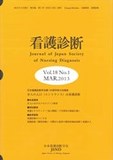Japanese
English
- 有料閲覧
- Abstract 文献概要
- 参考文献 Reference
本研究の目的は,概念「衝動コントロール」を概念分析し,NANDA-I看護診断の根拠レベルを向上させることにある.分析方法は,WalkerとAvant(2005/2008)を用いた.分析の結果,衝動コントロールの属性は,《自己に影響を与える行動パターン》と《他者へ影響を与える行動パターン》の2つの属性があった.先行因子は,《外的刺激》,《内的刺激》,そして《行動の結果を考慮しにくくする疾患》の3つがあった.結果は,《対自己》と《対他者》の2つが存在し,衝動コントロールの結果は非効果的なものだけであった.この分析により,NANDA-Iの看護診断「非効果的な衝動コントロール」の定義,診断指標,関連因子の内容が支持されたとともに,新たな診断指標,関連因子の追加の必要性が示唆された.
The purpose of this research is to analyze the concept“impulse control”and to improve the quality of NANDA-I Evidence Criteria. The method used was the one employed in Walker & Avant (2005). As a result, the concept analysis identified the following: [1] two attributes,“behavioral patterns that affect one's self”and “those that have an impact on others”; [2] three antecedents,“external stimulus”,“internal stimulus”and “diseases that make it difficult to anticipate the consequence of behavior”, and [3] two kinds of consequence, which were“self-directed”and “other-directed”. The results of impulse control have been found to be ineffective. The results of the present study provide support for the validity of the definition, defining characteristics, and other related factors adopted in the NANDA-I diagnosis Ineffective Impulse Control, and suggest that these new defining characteristics and related factors be added to this diagnostic standard.
Copyright © 2013, Japan Society of Nursing Diagnosis. All rights reserved.


